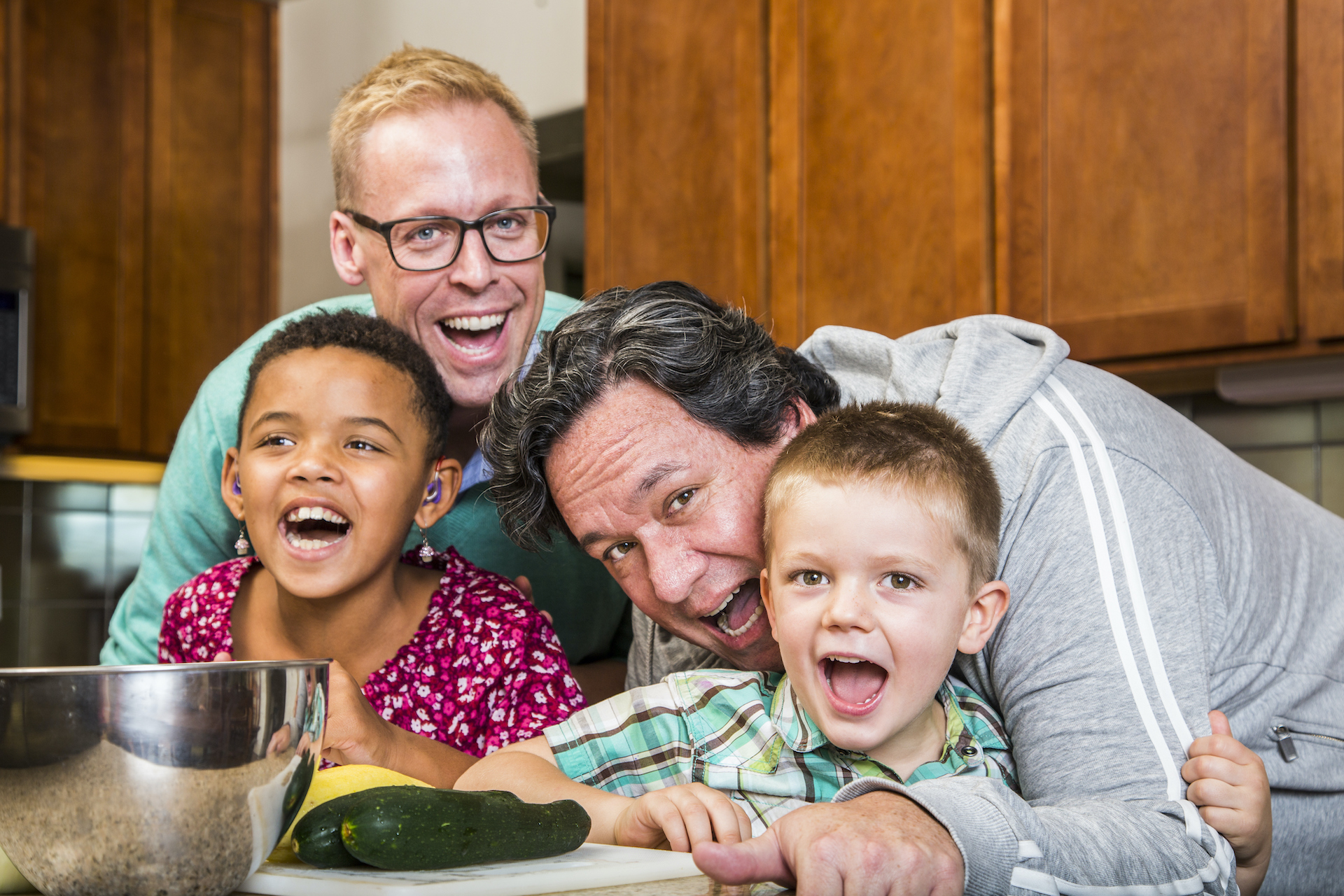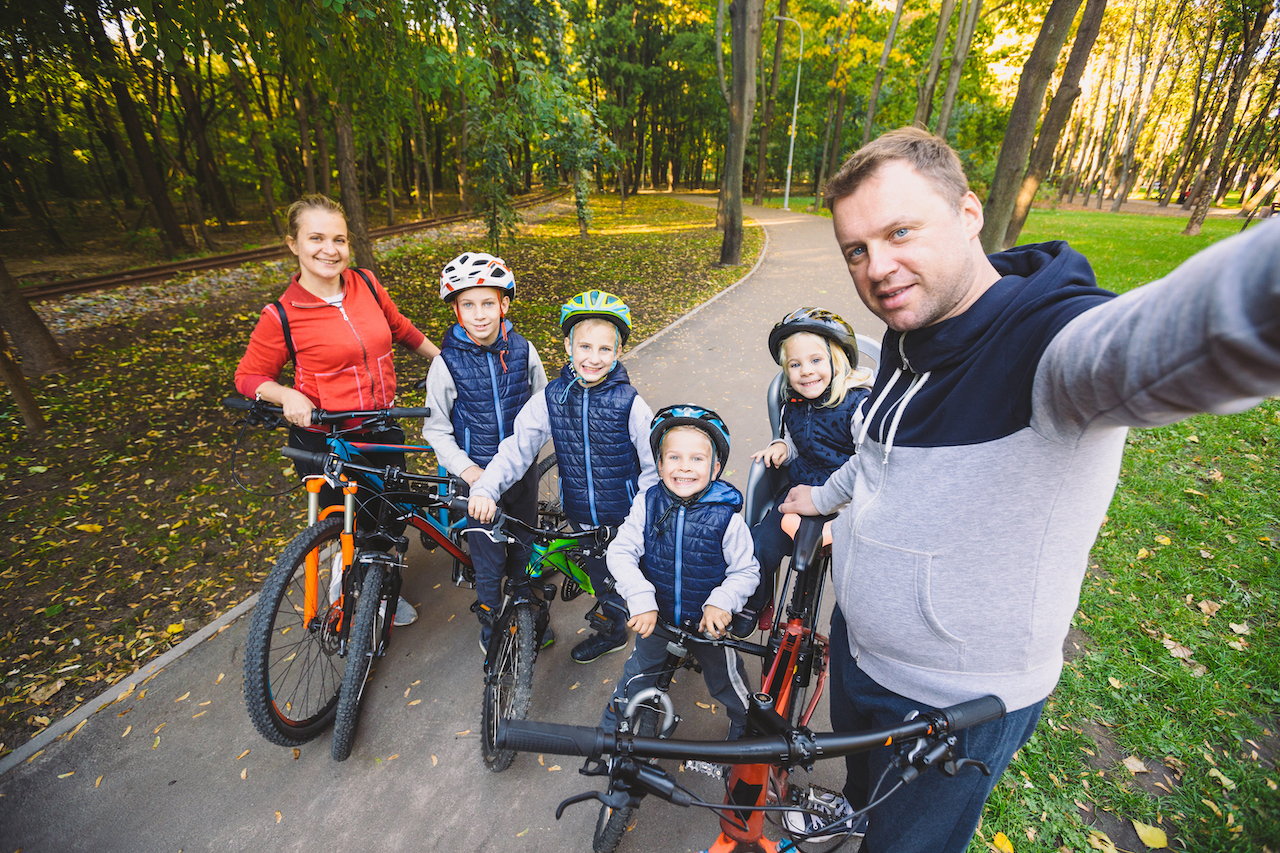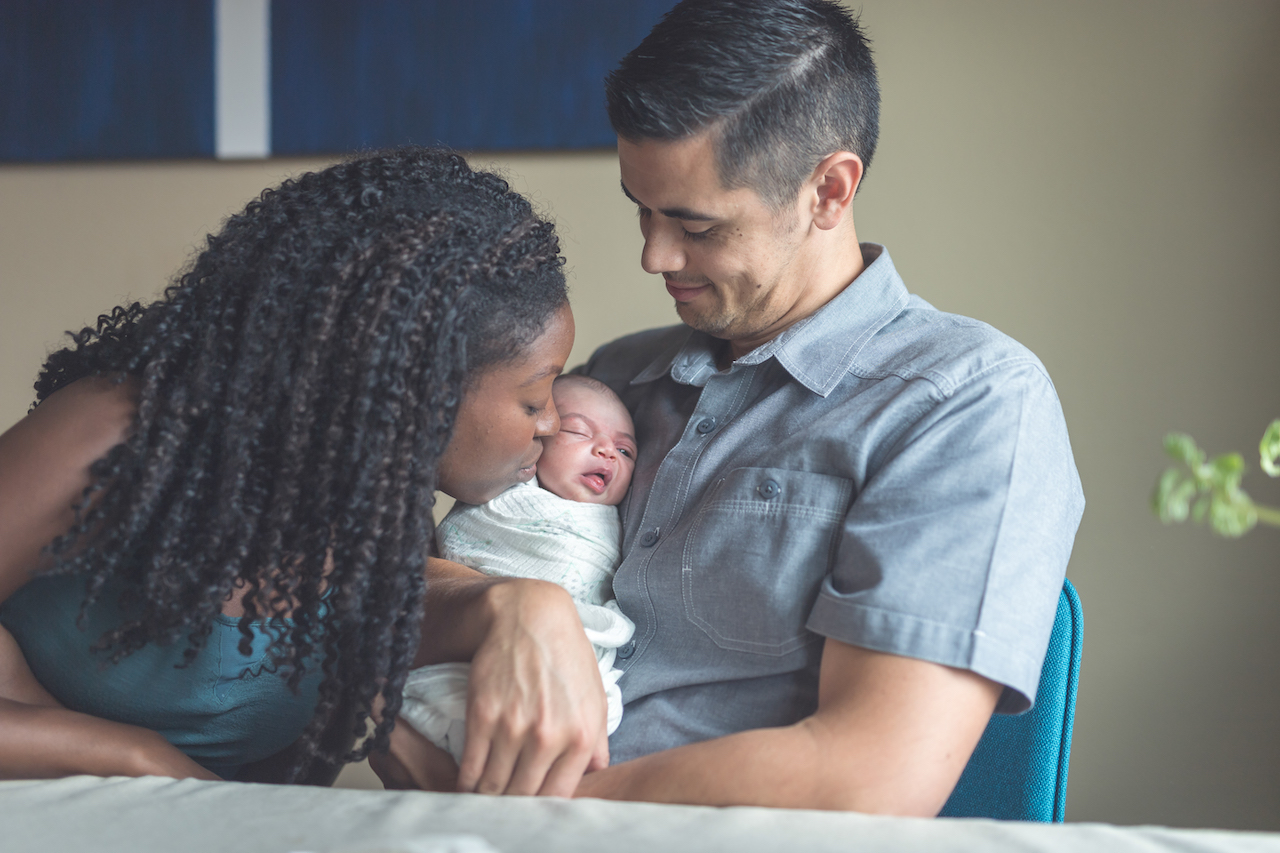
Ask DadPad, Parenting Advice
Ask DadPad: What’s the perfect family size?
Posted on 9th July 2021
Family size is an issue that most couples and parents will consider – do we want children at all and, if we do, how many would be the ‘right’ number? There’s also the equally fraught issue of what the ‘perfect’ gap between children might be. And, of course, that’s all assuming that the children and family you plan to have arrive at all and/or when you intend them to.
As this coming Sunday is World Population Day – an awareness day from the United Nations (UN) which is aimed at focusing the world’s attention on the importance of population issues – we thought it might be interesting and entertaining to consider some of the research out there in order to possibly reach a conclusion as to what the ‘best’ number of children to have might be.
What’s the average?
Clearly, the average number of children born to a family will differ across the world and also across time. The figures produced also focus predominantly on numbers-of-children-born-per-woman rather than, perhaps, more modern views of how a family is formed (e.g. through adoption or surrogacy, or blended families, etc).
These averages will of course also be impacted by those women who – for whatever reason – do not have any children, so this is all worth bearing in mind when considering what we mean by ‘family size’. For example, a Daily Mail article from twenty years ago reported that, although ONS figures (as reflected in the statistics below) had found that birth rates were falling overall, for those couples who did choose/were able to have children, the most popular number of children born to a family was actually three.
Looking at the data that is available, figures from the UN indicate that – worldwide – women had an average of 4.5 children each in the 1970s. However, by 2015, this had dropped to an average of less than 2.5 children per woman.
Closer to home, figures from the World Economic Forum (WEF) for the countries of the EU showed that women in the UK were having an average of 1.68 children in 2018, up slightly from the 2000 average. This put us in the top quarter for fertility rates across the region, although the numbers are fairly close overall; the ‘most fertile’ country is France, with women having an average number of 1.84 children, whereas women in Malta, at the bottom of the table, were having approximately 1.23 children each.
Interestingly, the WEF also looked into why families living in the north of Europe tend to have more children than those living in the south. They suggested that:
…what seems to matter is the status of women in relation to men… inequalities between men and women are more marked [in the south] both at work and in the private sphere [e.g. the sharing of household tasks].
Without day-long childcare, it is often challenging for both parents to hold a job, and one of the parents may have to stop working. Men do not plan to take care of their newborn baby beyond a few days, and women do not want a stay-at-home mom life like their mothers and grandmothers; moreover, couples need to maintain two incomes to maintain their standard of living.
Couples therefore delay the arrival of a child if it is not possible for them to reconcile work and family. By postponing childbirth, some couples ultimately give up on it…. [The] relatively high fertility [in Northern European countries] is one of the indirect consequences, not necessarily intended initially, of policies aimed at promoting equality between women and men.
This, of course, very much reflects one of our underpinning aims here at DadPad – to help get men ready for fatherhood, to have the skills and mindset to be the best dad that they can be, and the most supportive partner for their baby’s mum. We’ve looked at the fact that these qualities not only help dads, but also help to empower and achieve better equality for women in our DadPad as a feminist concept blog post.
Carrying on looking at the data, the WEF figure for the UK reflects research carried out by Mr Men (yes, you read that right!) which suggested a UK average of 1.7 children per family.
The Office for National Statistics (ONS) has estimated that, in 2020, of the just over 8 million families in the UK, 43% had one child, 42% two children and 15% had three or more.
Overall, then, although it’s difficult to be precise and exact, what is clear is that the traditionally accepted average of ‘2.4 children’ no longer seems to be the case in the UK; families look to be getting smaller.
Is smaller better?
Writing in patient.info, Dr Mary Lowth identified some of the advantages of having just one child, including that the parents are able to focus all their resources on that child and that it amounts to less of a lifestyle adjustment for the couple. Advantages for the child include that they will have their parents’ undivided attention, there are no sibling rivalries or arguments to overcome, and that they are perhaps better able to become independent individuals. Others have acknowledged the potential benefits for the world that having just one child brings – your family will be making less demands on the resources on the planet, and minimising your overall impact on climate change.

At the same time, there are a number of commonly-acknowledged potential downsides to having an only child. The child, for example, may experience extra pressures – perhaps in relation to academic performance, carrying on family traditions/in a family business, production of grandchildren, caring for elderly parents – due to being their parents’ ‘only hope’. Psychologist Mike Leary, writing in the Huffington Post, also flagged this up, suggesting that, for only children: “Failure is not an option”. There’s also the intensity that the child may feel, especially if their parents are arguing. And, as parents, you will also have to deal with all the other negative connotations that come with having produced an ‘only child’…
For example, the concept of the ‘spoiled brat’ has long been associated with an “only”. It is believed to have originated from studies and comments by the American psychologist and educator, G Stanley Hall, in the 1880s. He famously and shockingly commented that, “Being an only child is a disease in itself”!
In an abc news article from 2007, social psychologist Susan Newman identified some other stereotypes that also continue to persist, some 120 years later including that only children are:
- aggressive
- bossy
- lonely
- maladjusted
However, Newman has also pointed out that – happily and reassuringly – there are “hundreds and hundreds of research studies that show that only children are no different from their peers… Only children don’t live up to the myths and stereotypes.”
Benefits of two or more?
Obviously, just as benefits and downsides for having one child have been identified, so have advantages and disadvantages of having siblings also been found.
Research published in 2015 from the Australian Edith Cowan University found that having siblings will improve young children’s social, problem-solving and negotiation skills. Dr Lowth suggests that having two or more children ensures that each child will (theoretically, at least!) have a companion through all the of life’s trials and troubles, and you also of course have the financial benefit of being able to reuse clothes, toys and other childhood essentials.
But obviously having two children will place an increased demand on your time and energies as parents, which can be tiring – especially in the early days if your children are close together in age – along with increased expenses and the challenges of negotiating sibling relationship dynamics.

Going higher than two is seen by many as being a ‘big step’ – in most people’s eyes, it takes you into ‘large family’ territory. Suddenly, things like family day out or holiday ‘package deals’ disappear, cars need to be upsized and maybe even homes upsized, given that most family-focused products appear to be focused on the 2+2 set up. Life is inevitably going to become more chaotic and tiring, too.
However, Jessica Offer, writing in Babyology, suggests that: “…the case for larger families is strong. There is something about the desire for a village and extended kin group, where labour and resources are pooled and shared amongst a larger group of people. Sorta like the making of my very own tribe.” Dr Lowth backs this, noting the benefits that come from always having someone there, and the additional fun and excitement that bigger numbers will bring.
What’s the magic number for a happy family?
So, has a ‘magic’ number been found for a family, to guarantee maximum happiness for all? It won’t surprise you to know that this is also something that has been researched.
For example, the pregnancy and parent-focused company Bounty found in 2011 that the ‘happiest’ families were those with two girls, followed by those with ‘one of each’ and then two boys. The reasons given for two girls making for the greatest contentment included that they were ‘easy to reason with’ and that they would also ‘play nicely’ together. What’s interesting, though, is that bottom of the list for happiness was families with four girls, due things like the amount of noise that they generated and the time that they took to get ready for school!
The Bounty research also found that those with three or four children (whatever combination of gender) were less happy than those with one or two children. However, two separate research papers from 2015 (by Eurostat and the Edith Cowan University research mentioned above) found that families with three, four or more children were happier than those with smaller families. Reasons cited included the potential for better support between siblings and increased positive social interactions.
This all chimes with comments from the economist and author of the book ‘Selfish Reasons to Have More Kids’, Bryan Caplan. He indicates that many of the perceived advantages in relation to having just one or two children – such as being able to better ‘invest’ financially in your child’s education and extra-curricular activities – actually don’t have much impact on their future earning potential or their happiness. Instead, he suggests that, “if they can afford to, [parents should] consider having more kids, because kids can be fun and fulfilling.” Caplan reaches the instinctive conclusion that four (or maybe even more) is the optimal number of children to have.
Mary Acklin in civicscience.com also flags up another point apparently in favour of bigger families: “it seems people born into large families might have been happy with their upbringing, leading them to create similarly large families – mirroring those they grew up with.”

So, the perfect number of children is…?
It might not come as a surprise – if you’ve got this far – to learn that there is no right or simple answer to the above question. The research studies all come out with different answers and it seems that you can probably find positive evidence to support whatever choice you decide to make or situation that you find yourself in.
The opinions of those around and close to you might also be a consideration. However, neuroscientist Dean Burnett has suggested that – if you’re concerned about how you’ll be viewed by others – you probably can’t win, whatever decision you make or situation you find yourself in, because:
- having no children is wrong: you’ll be seen as having made an ‘unnatural’ choice and you’ll be forever plagued by people asking you when you’re going to have a child/why you’ve not had any
- having one child is wrong: there are the negative stereotypes, the perception that children ‘need’ siblings and, again, you’ll be constantly asked when you’re having another
- having two children is wrong: although potentially the most acceptable option, you might still find yourself open to questioning in relation to the gap that you’ve had between them (Mike Leary suggests that the perfect spacing is three years, in case you’re wondering), whether you need one more to ensure that you have ‘one of each’ and – if you’ve had twins – whether you’re properly committed to parenthood if baby’s mum has only experienced one ‘birth’
- having three or more children is wrong: being above average will inevitably lay you open to criticism for being self-indulgent
Burnett’s answer?
Given how so many people have such strong views on children and parenting, someone’s going to find fault in your decisions no matter what they are, no matter how irrelevant their arguments may be. All you can really do is put up with it, even though it’s hard to think of something that is so fundamentally “your business”.
You should also, of course (and as advocated by Dr Lowth), consider the impact that family size will have on your relationship. Having and raising children is never easy…
Yes, the evidence might potentially fall a little more in favour of larger families, but that only works if you have the physical (are you a couple that finds it easy or difficult to get pregnant, has mum had tricky pregnancies and/or traumatic births, for example?), emotional (have either of you suffered mental health difficulties in the perinatal period, or ongoing mental health struggles that might make it harder to cope with more children?), and/or financial (can you afford the additional expenses – or, at least, the financial pressures – that will come with larger families?) capacity to do that.
Instead, Jessica Offer suggests that:
…at the end of the day, parents need to do what works best for them. There are obviously multiple contributing factors to consider, and each family can go on to make their own kind of happy, in their own way.
Susan Newman supports this:
What really counts is that the parents be happy and content with the decision they make, because that will affect how they raise that child.
So, for the final word, we quote clinical psychologist Linda Blair:
The conclusion? Forget numbers. If you want to raise happy children, you simply need to decide that you’re delighted with the size of your family, however many children you have.

References:
Juju Chang and Sara Holmberg in abc news – The Only Child Myth – 20 Aug 2017
Joe Pinsker in The Atlantic – What number of kids makes parents happiest? – 03 May 2019
Jessica Offer in Babyology – The number of kids that makes parents the happiest, apparently – 06 May 2019
Mary Acklin in civicscience.com – The more the merrier: a link between siblings and happiness – 04 Sep 2018
Nilufer Atik in Daily Mail – Three, not 2.4, children is mother’s idea of perfection – 2001
Dean Burnett in The Guardian – What is the correct number of children to have? – 26 Nov 2015
Mike Leary in Huffington Post – What’s the best number of children to have? A psychologist weighs in – 31 Dec 2017
Office for National Statistics (ONS) – Families and households in the UK: 2020 – 02 Mar 2021
Dr Mary Lowth in Patient.info – How many children should you have? – 04 Dec 2017
Linda Blair in The Sydney Morning Herald – How many children is the perfect number? – 23 Oct 2018
Tim Querengesser in Today’s Parent – Why you’re wrong-and right-about having an only child – 01 Oct 2020
Toddle About – Forget 2.4 kids: the average UK family now has 1.7 children… – undated
United Nations World Population Day
World Economic Forum – People have more children in the north of Europe than the south. Here’s why – 13 Jan 2021

